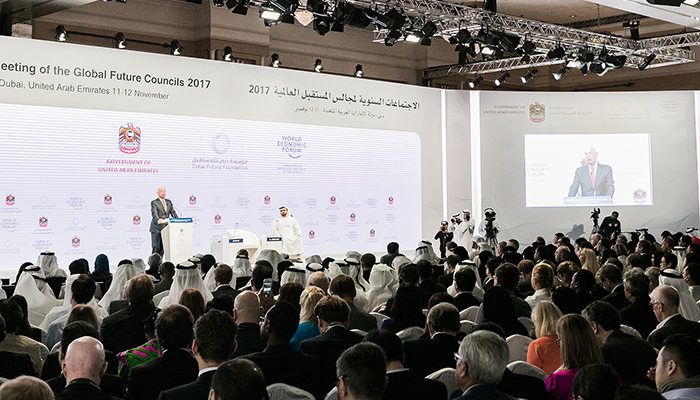President Shirley Ann Jackson recently returned from the World Economic Forum’s Annual Meeting of the Global Future Councils, which took place Nov. 11-12 in Dubai. The annual meeting brought together more than 700 members of the Network of Global Future Councils to shape a better future.
The World Economic Forum’s Network of Global Future Councils is the world’s foremost interdisciplinary knowledge network dedicated to promoting innovative thinking on the future. The network convenes thought leaders from academia, government, business, and civil society to challenge conventional thinking and develop new insights and perspectives on the key global systems, as well as the impact and governance of key emerging technologies.
This year’s meeting was the second in the councils’ two-year term. It allowed members to jointly explore ways of facilitating systemic change in critical areas such as health, energy, and infrastructure through breakthrough technologies related to the Fourth Industrial Revolution.
“Scientific discovery and technological innovation are at the core of the solutions to many of the great challenges and opportunities of our time,” said President Jackson, co-chair of the Global Future Council on the Future of International Security. “Universities play a significant role in generating the ideas and sparking the innovations that drive the global economy and sustain our security. It is imperative that universities, business, and governments, along with NGOs, collaborate in charting a sustainable path forward. This gathering of world leaders offered an unparalleled opportunity to set the goals and enhance the interconnections that can help strengthen our institutions as we work to meet the challenges and tap the opportunities before us.”
The 2017 council focused on the future of the international security system and how to shape it. The following dimensions were highlighted:
- Strategic stability: What should be done to ensure technological capabilities are used in ways that maintain stability and promote a better level of international security as a global common good? What can be done to achieve better mutual understanding and transparency, reducing the risks of miscalculation? How can we avoid a future where technology favors the offensive, or emboldens aggression? What opportunities exist to use technology to solve familiar and new security challenges?
- A shift in the public/private balance: Much of the enabling technology for the Fourth Industrial Revolution is originated, developed, and exchanged in the private sector, where R&D budgets far exceed those of many industrialized countries. The scope for “dual purpose” technologies is increasing too. How will this affect issues like arms control regimes, proliferation, and the balance of power between state actors and non-state actors?
- New domains: Powerful, cheap, and freely available technology is lowering barriers to entry in new domains such as cyber, space, and the ocean depths. Where regimes of governance lag behind, this can tempt security actors to explore new operational courses of action, and prompt new arms races. What are the most pressing areas for action on governance, and what other approaches can be considered for preservation of global security?
Cynthia Collins, associate professor of chemical and biological engineering at Rensselaer, also participated in the meeting. Collins is a member of the Global Future Council on the Future of Biotechnology. “The Global Futures Councils provide a unique opportunity for experts from different sectors to step away from our silos and work together to develop and recommend innovative, cross-cutting solutions to global challenges. In discussions ranging from healthy living and precision medicine to modern industrial biotechnology, the need for multidisciplinary teams and system-level approaches to achieve the desired changes in these critical areas was a recurring theme.”
While in Dubai, President Jackson also hosted a reception for Rensselaer alumni in the area, who are forming a new Rensselaer Alumni Association chapter.


